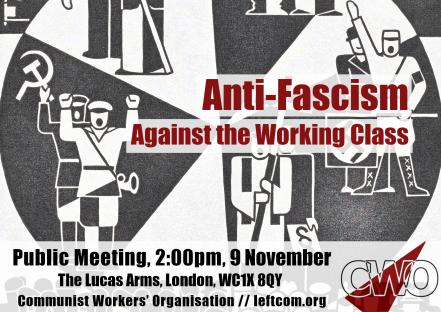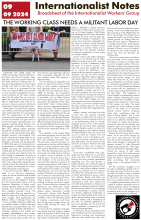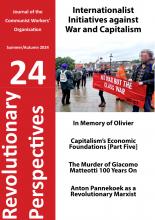September 2024
The cause of capitalist crisis
Recently we rec'd correspondence which amongst other points was concerned with the mechanism by which capitalism enters crisis.
the relevant section is as follows;
_The mono-causal explanation of the economic crisis: my
position on that point is situated between the explanation offered by
Paul Mattick (Sr.)/Battaglia Comunista/Communist Workers Organisation
and the one recently offered by Controversies (Forum for the
Internationalist Communist Left). Namely, as well as the latter
“forum”, I see the insufficient demand as an independent cause of
economic crises, but in difference to their position, I think that any
long period of stagnation finds its ultimate source in an increasing
ratio of dead labour to live labour, the demand falls independent
thereof being able of provoking only minor temporary recessions.
Nevertheless, I agree with their judgement on a raising average rate
of profit since the eighties thanks to a steeply raising rate of
surplus value, induced by a preceding fall of the average rate of
profit, all of which is confirmed by the official statistics. Thus, a
shrinking “final demand” would be the most important obstacle to a
possible expansion of the production. I know that at least Battaglia
Comunista argues that the bourgeois statistics cannot indicate a
falling rate of profit as intended by Marx since the latter is
measured in quantity of average social labor and not in US dollars or
in equivalent value of the products used for calculating inflation,
but I don’t think it’s relevant. I regard it as irrelevant since
during the critical period the acceleration of the production process
of what composes the fixed capital was not at all inferior to the
acceleration that took place in the production process of that which
composes the “final demand”. Thence, in my opinion, there is an actual
crisis of accumulation (at the origin of the expansion of fictitious
capital), but not an actual fall of the average rate of profit._
Now, my thought is that we consider that capitalism has a very clear raison d'etre, which is valorisation of capital, endless accumulation which requires adequate profit rates to continue expanding. Any other concern is secondary, forced upon it and dealt with to maintain the conditions for continual expansion.
The identification of a bottle neck in the expansion process, the tendential decline in profit rates as investment in factors other than living labour increases faster than investment in the profit producing exploitation of labour power, is not the same as saying that there is an actual decline in profit rates, although this may be the case.
The tendential decline in profit rates manifests itself, apart from an actual realised decline in the rate of profit, in al the measures taken to shore up profit rates and which ultimately prove to be a fatal medicine for the capitalist patient.
It is the attempt to make up for lower profit margins by eroding the share of the producing working class, be it through wage cuts, cuts in services , harsher conditions, the syphoning off of capital from the employment-providing real economy to the realm of money making money without production, the speculative realm, etc which give rise to the phenomenon of lack of demand or overproduction.
The drive for profit to expand production is the same drive which has to impose class war against the working class.
Being a constant feature, i.e. the tendency becomes ever more intense, the end result is that the bourgeoisie is effectively forced to goad the working class into defensive and eventually revolutionary struggle as its conditions of life become ever more intolerable.
Start here...
- Navigating the Basics
- Platform
- For Communism
- Introduction to Our History
- CWO Social Media
- IWG Social Media
- Klasbatalo Social Media
- Italian Communist Left
- Russian Communist Left
The Internationalist Communist Tendency consists of (unsurprisingly!) not-for-profit organisations. We have no so-called “professional revolutionaries”, nor paid officials. Our sole funding comes from the subscriptions and donations of members and supporters. Anyone wishing to donate can now do so safely using the Paypal buttons below.
ICT publications are not copyrighted and we only ask that those who reproduce them acknowledge the original source (author and website leftcom.org). Purchasing any of the publications listed (see catalogue) can be done in two ways:
- By emailing us at uk@leftcom.org, us@leftcom.org or ca@leftcom.org and asking for our banking details
- By donating the cost of the publications required via Paypal using the “Donate” buttons
- By cheque made out to "Prometheus Publications" and sending it to the following address: CWO, BM CWO, London, WC1N 3XX
The CWO also offers subscriptions to Revolutionary Perspectives (3 issues) and Aurora (at least 4 issues):
- UK £15 (€18)
- Europe £20 (€24)
- World £25 (€30, $30)
Take out a supporter’s sub by adding £10 (€12) to each sum. This will give you priority mailings of Aurora and other free pamphlets as they are produced.
ICT sections
Adverts
Glasgow Bookfair
RED AND BLACK CLYDESIDE BOOKFAIR
The CWO will have a stall at the Red and Black Clydeside Bookfair, there will also be an NBWCW meeting.
When: Saturday, 7 December 2024
Where: TBA
London Public Meeting
ANTI-FASCISM AGAINST THE WORKING CLASS
PUBLIC MEETING AND DISCUSSION
On 30 July riots broke out across the UK which targeted Muslim neighbourhoods and places sheltering migrants, following a stabbing in Southport the day before. The riots were fuelled by fascist groups and far right websites spreading the conspiracy theory that the attacker was a Muslim asylum seeker.
Decades of racist propaganda from mainstream news sources, which blame immigrants for workers’ decline in their standard of living, have led to many thinking that immigration into Britain is the cause of reduced wages, homelessness, a collapsing health service, failing schools etc. rather than increased exploitation of the working class and capitalism’s economic crisis.
The response to this from capitalism’s political left has been to organise against fascism, with national demonstrations of the ‘great and good’ against the riots and against racism in defence of democratic freedoms. But fascism and democracy are simply strategies of the capitalist class to continue exploiting us. Strategies they use to recruit us to fight their wars. Organising specifically against fascism, amounts to supporting one section of the capitalist class against another. It is still in favour of the capitalist system. What we need is to oppose the entire capitalist system through the broader class struggle, leading to the eventual overthrow of capitalism itself.
While other approaches to anti-fascism involve small groups, engaged in physical confrontations with fascists, it is an approach that similarly offers no solutions to a system that breeds racism.
We argue that only the end of capitalism can put an end to poverty, misery and racism and only the working class can achieve this.
Come join us in a public meeting to discuss this.
When: Saturday, 9 November 2024, at 2:00pm
Where: The Lucas Arms, 245A Grays Inn Rd, London, WC1X 8QY (nearest tube: King's Cross)
Communist Workers' Organisation
IWG Meetings
IWG MEETINGS
The IWG will be holding regular in-person meetings where sympathizers are encouraged to come and get in contact.
New York: Last Saturdays of the month 3:30pm at Peculier Pub (145 Beecker St)
Philadelphia: Last Saturdays of the month 11am at B2 cafe (1500 E Passyunk Ave)
Lambertville, New Jersey: Tuesdays 8/13, 8/20, and 8/27 at 7 PM in the Lambertville Library (6 Lilly Street, Lambertville, NJ), for discussions on the Russian Revolution and Counter-Revolution.
Columbus: Last Sunday of every month, from 8PM-10PM, at Kafe Kerouac (2250 N High St, Columbus, OH).
Los Angeles: Please contact to get in touch.
Means of contact:
Email: us@leftcom.org
Instagram: @iwg.official
Facebook: @iwgusa
Twitter: @IWGOfficial
Recent publications
August 2024
Aurora is the broadsheet of the ICT for the interventions amongst the working class. It is published and distributed in several countries and languages. So far it has been distributed in UK, France, Italy, Canada, USA, Colombia.
Out now!
Journal of the Communist Workers’ Organisation -- Why not subscribe to get the articles whilst they are still current and help the struggle for a society free from exploitation, war and misery? Joint subscriptions to Revolutionary Perspectives (3 issues) and Aurora (our agitational bulletin - 4 issues) are £15 in the UK, €24 in Europe and $30 in the rest of the World.
Written by Jock Dominie. £12, 276pp.
The Russian Revolution remains a landmark event in history. For the bourgeois historians, the October Revolution is thought to be a tragedy that set back the achievements of the “democratic” February Revolution, and allowed the Bolsheviks to wreak havoc on their citizens and the world. For the Stalinists, the events of 1917 paved the way for the birth of the USSR, which they point to as a prototypical example of “socialism in one country”. In reality, the February and October Revolutions were both part of the same proletarian revolution.
The book can be ordered by emailing us at uk@leftcom.org and asking for our banking details, or by donating the cost of the publications required via Paypal using the “Donate” button. Postage charges should be added. If in the UK, and paying direct to our bank account, first class postage is free. If via Paypal add £2. For Europe cost of a copy with postage is €20 (EUR), for Australia it is $42 (AUD) and for the USA and anywhere else in the world it is $27 (USD).
User login

This work is licensed under a Creative Commons Attribution 3.0 Unported License.









Marx quite clearly says that
Marx quite clearly says that speculation ("the origin of fictitious capital") arises at the point in the cycle of accumulation when the capitalists as a class discover that the rate of profit on investment in their own production is no longer worth it. Hence they go chasing speculative investments although Marx never saw the kind of speculation we have today (CDS's, derivatives hedge funds etc).
”…the acceleration that took
"...the acceleration that took place in the production process of that which composes the “final demand”..." What I actually wanted to say is "...of that which MEETS the "final demand"..." I'm sorry for the lapsus I made.
Regarding the explanation offered by Stevein7, what I can notice is that there is no substantial difference between the explanation offered by the ict and the one offered by Controversies, although the latter asserts to offer an explanation differring significantly from the classical one proposed by P. Mattick and endorsed by the ict. I think that, consequently, the ict should be gladdened by the abandonment of the icc by the comrades of Controversies since they had enough courage and self-criticism to revise one of the two most incredibly absurd theories endorsed by the international communist current, i. e. the luxemburgian interpretation of the capitalist crises (which I supported myself before reading Marx a bit more seriously and before thinking over the incredible practical implications of such a theory) and the "duality theory" of the transitional period (=proletarian dictatorhip parallel to an anti-proletarian but inevitable state). I must add that even the duality theory of the transitional period has been seriously questioned in some of the articles of the Controversies "forum", though its correctness is still debated there. I know that the support that Controversies offered to the Onorato Damen Institute could be an obstacle to a future collaboration of the ict and the said ex-militants of the icc, but I hope the future rising intensity of the class struggle will contribute to more maturity and responsability in the ranks of all the left communist groups and tendencies and consequently to a clearer distinction between what is essential and what is not.
Re:
Sure, but it seems that it also arises when the rate of profit is high enough to offer substantial profits from a merely reproductive or even shrinking scale of production but there is no sufficient demand so as to expand it, and thence these huge profits have to be put elsewhere. Namely, in the period 1982-2008 the rate of profit constantly rose, save during short recessions, but the production expansion at best followed the world population increase.
“Sure, but it seems that it
"Sure, but it seems that it also arises when the rate of profit is high enough to offer substantial profits from a merely reproductive or even shrinking scale of production but there is no sufficient demand so as to expand it, and thence these huge profits have to be put elsewhere. Namely, in the period 1982-2008 the rate of profit constantly rose, save during short recessions, but the production expansion at best followed the world population increase."
Just vague thoughts here, but say smaller companies are going under when large ones are still prospering, then they may well take an ''easy option" of withdrawing from the prductive sphere and the capital released goes to the speculative sphere which for a while remains a good bet as long as the real economy is doing well enough.
On a global scale profit rates may be relatively healthy, but in certain areas of the world that is not the case and again, the easy option is withdrawal from production.
I suppose what I am saying is that the
is not a moment in time shared by all but is a process which extends over a period of time.
What about those large and
What about those large and prosperous corporations that extract high profits and are able to continue reproducing the existing scale of its own production but cannot reinvest them for a globally shrinking final demand which precludes the expansion of the scale of production? Even if we conceived "the point in the cycle of accumulation..." as a protracted period of time, the latest example of mine still wouldn't fit.
So company x sells y amount
So company x sells y amount of product z at a profit rate of a.
But to sell significantly more would have to lower prices.
So that would entail a diminished rate (but perhaps higher mass) of profit, or stepping up exploitation by some method, which seems compatible with what I said in the first post.
If neither of these options seemed palatable, then letting any excess go to the realm of speculation seems reasonable.
I run my own business as well as working in public sector education (don't worry, I earn peanuts). I try and save some in the bank, expansion is not for me.
The bank speculates.
What is the barrier stopping other busnesses expanding?
Final demand is a fiction (maybe I am being stupid here, so corrrect me). The market is not a vessel you can fill.
Change the price and demand goes up and down.
What is the constraint on price? What is the final word on how wages are decided? Adequate profit rate.
Please criticise, I feel a bit weak in this area.
What we are arguing is whether the tendential decline in profit rates is the root cause of incremented worker exploitation, insufficent demand etc or not.
Obviousy, from the outset there will be a problem with demand as profit is required from day 1.
“So that would entail a
"So that would entail a diminished rate (but perhaps higher mass) of profit, or stepping up exploitation by some method, which seems compatible with what I said in the first post.
If neither of these options seemed palatable, then letting any excess go to the realm of speculation seems reasonable.
I run my own business as well as working in public sector education (don’t worry, I earn peanuts). I try and save some in the bank, expansion is not for me.
The bank speculates."
I've never said that the impossibility of expanding the scale of production is the only possible cause of speculation; I merely asserted that it can cause it and I'd say it's pretty clear from how I put it in my comment.
"What is the barrier stopping other busnesses expanding?
Final demand is a fiction (maybe I am being stupid here, so corrrect me). The market is not a vessel you can fill.
Change the price and demand goes up and down.
What is the constraint on price? What is the final word on how wages are decided? Adequate profit rate."
Well, a single enterprise could lower the prices if it hasn't already lowered the wages too much, but on the global level it can't work like that. Namely, if the prices fall globally then the wages have to fall globally which makes the demand shrink nominally but in fact remain inaltered. But if prices don't fall and the wages fall (on a global scale), and sometimes it is the only possible way to counter the tendencial fall of the average rate of profit (i. e. to avoid an actual decline of the rate of profit or even to increase the profits, the latter case having been empirically verified), then the final demand really shrinks (since rising profits for the bourgeoisie don't imply at all a rising propensity of the same to buy most of what is produced). So, it doesn't seem to me to be that much fictitious.
My answer was yes and I can but repeat it.
Un ossu Correct me if I am
Un ossu
Correct me if I am wrong but you seem to think that the mass of profits and the rate of profit are the same thing. Big corporations make massive profits (their monopolisitic position means they can also draw value from weaker capitals). Thus they have money sloshing around BUT at a certain point in the accumulation cycle the rate of profit begins to diminish (and yes the "poverty and restricted consumption of the masses" has something to do with it too) and thus they look for other ways to invest ther capital. Since the crisis of the cycle is now beginning they turn to speculation as Marx illustrates in Capital Vol 3. So mass of profits can exist even when the rate of profit in general is falling. The problem then is that there needs to be a massive devaluation of existing capital values to re-start the process. We think you can only undertand this cyclical nature of capital accumulation through the law of the tendency of the rate of profit to fall which is not as monocausal as the ICC maintain because it encompasses both the production and distribution of commodities as a single process.
I use the expression “rate of
I use the expression "rate of profit" as Marx used it in Das Kapital (i.e. Pv/(C+V); in difference to how he used it in Value, Price and Profit: Pv/V). Of course, as you are writing, Pv can rise even if Pv/(C+V) falls, but I was talking about an actual rise of Pv/(C+V). More precisely, I was referring to the period 1982-2008 during wich the average rate of profit rose inspite of the rise of the proportion between dead labour and live labour (C/L) since the beginning of the seventies. From the beginning of the seventies to the beginning of the eighties did an actual fall of the average rate of profit take place, but subsequently did it rose again, due to the firings and the slashes of direct and indirect wages (i. e. Pv/V rose enough to annull the effects of the rise of C/V). Of course, the effects of the rise of C/L (and the consequent rise of C/V) cannot forever be annulled by the rise of Pv/V; it's even possible that the rate of profit won't rise ever again before a total krach. Anyway, it is during the period between 1982 and 2008 that the enormous expansion of the speculation began, so it was not due to an actual fall of the average rate of profit.
When I wrote
instead of "....or even to increase the rate of profit,...." I simply made a lapsus calami; it does not mean that I can't distinguish the mass of profits and the profit rate.